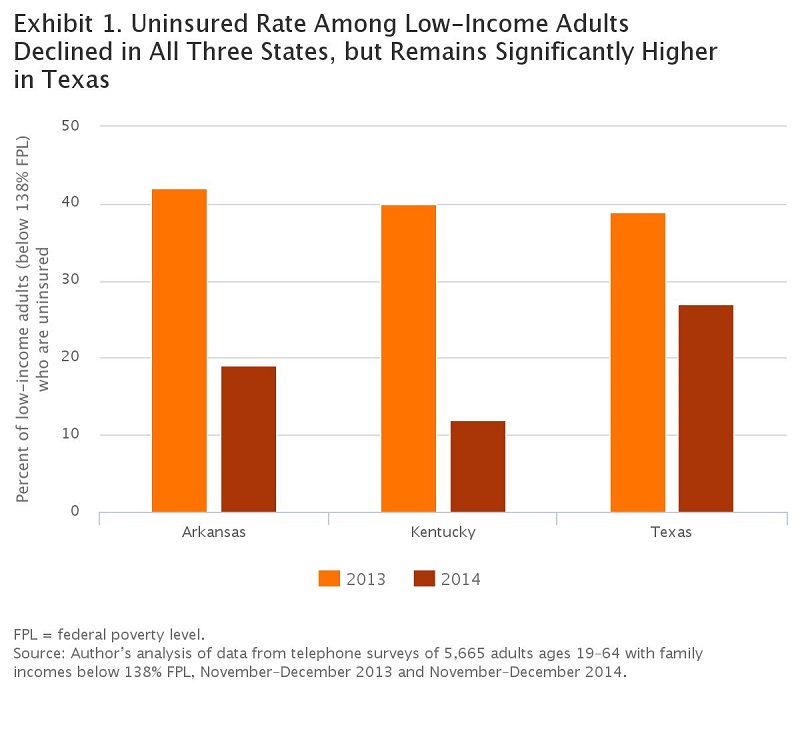Affordable Care Act Brought 30% Drop for Texas Uninsured Rate
A report outlines how the uninsured rate in Texas fell by 30 percent since the year the Affordable Care Act came into effect.

- The Patient Protection and Affordable Care Act has made a significant difference for the average American citizen when it comes to ensuring greater medical coverage and healthcare access. The uninsured rate has been dropping steeply throughout the country ever since the Affordable Care Act came into effect.

A report from the Episcopal Health Foundation and Rice University’s Baker Institute for Public Policy outlines how the uninsured rate in Texas fell by 30 percent since the year the Affordable Care Act came into effect. According to a press release from the Episcopal Health Foundation, only 18 percent of adults from Texas lack health insurance as of March 2016, which is a drop from September 2013’s 26 percent uninsured rate.
Regardless of age, ethnicity, or income level, the report found a steady decline in uninsured rates among the entirety of the Texas population. Older Texans actually had the largest drop in the uninsured, the report found. Texans between the ages of 50 to 64 showed a decrease from 21 percent to just 10 percent in their uninsured rate from the moment the Affordable Care Act came into effect.
“For the older group, the ACA made health insurance much more affordable, because the law limits insurers from charging older adults no more than triple the cost for the same health insurance plans as younger adults,” Vivian Ho, the Chair in Health Economics at the Baker Institute and Director of the institute’s Center for Health and Biosciences, stated in the press release. “However, limiting premium variation by age made Marketplace policies less attractive to younger adults, which is why their uninsured rate fell less.”
Among individuals in Texas who earn an income between $16,000 and $47,000, the uninsured percentage fell by more than 42 percent, the press release states. The Affordable Care Act has brought a variety of benefits for consumers especially the tax subsidies offered through the health insurance exchanges that would help cover the monthly premium costs of health coverage among low-income individuals and families.
“These latest numbers confirm the continuing downward trend in the number of uninsured Texans that began as the ACA was implemented,” Elena Marks, EHF’s President and CEO, said in a public statement. “For more than a decade prior to the ACA, the uninsured rate remained above 20 percent and was rising. It’s now clear that it’s moving in the opposite direction, and the ACA deserves the credit.”
However, one choice taken by the state government in Texas may have actually left a gap in healthcare coverage and access to medical services among low-income individuals. Texas is one of the 19 states that have still not expanded their Medicaid program using the funding provided by the Affordable Care Act.
The Supreme Court ruling in 2012 on the ACA found that states would have the option to participate in Medicaid expansion instead of being required to do so. This led a number of states including Texas to decline the funding from the federal government and continue serving its current Medicaid population.
“For those who are below 100 percent of the poverty level, they can’t get a subsidy in the marketplace so they are faced with nothing or paying 100 percent of the premium,” EHF’s Elena Marks stated in an interview. “The people who have higher incomes are eligible for subsidies, but those with lower incomes are not. The Affordable Care Act was designed so that the lowest-income families would be covered by Medicaid. When the Supreme Court made [Medicaid expansion] optional, it meant that it was up to each state to make that decision.”
“Texas is one of an increasing minority of states that has not expanded Medicaid. For a significant number of Texans estimated to be a minimum of one million, there is nothing that will change for them outside of a Medicaid expansion.”
The Commonwealth Fund stated in a report that the state of Texas still has nearly 5 million uninsured people and the lack of Medicaid expansion has left a coverage gap that prevents healthcare access as well as the ability to pay for needed prescription drugs and primary care.
Throughout states that declined to expand their Medicaid coverage, only a small fraction of low-income adults are eligible for this particular public health insurance option. In Texas, Medicaid coverage is offered to disabled adults with an income below $9,000 a year, pregnant women with incomes totaling around $23,500 a year, and parents with incomes below 19 percent of the federal poverty level.
The Commonwealth Fund report surveyed the insurance rate of low-income Texans against low-income adults from states that expanded their Medicaid programs. The results show that the uninsured rates dropped much faster in the two states that expanded their Medicaid program - Arkansas and Kentucky - than in Texas between 2013 to 2014.

Nonetheless, the report from the Episcopal Health Foundation and Rice University’s Baker Institute for Public Policy states that 1.3 million Texans enrolled in the health insurance exchange in early 2016, which shows that the Affordable Care Act has brought more healthcare coverage for the state of Texas.
In order to close the gap in healthcare access among low-income adults and families, the state government in Texas should consider expanding their Medicaid program and utilizing the resources set aside by the Affordable Care Act.
Image Credits: Commonwealth Fund
Dig Deeper:
20% of Insured Americans Struggle with Paying Medical Bills
70% of Uninsured Texans Find Medical Coverage Costs too High
